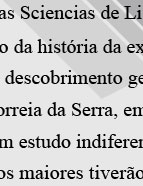

................................
Another important implication of this paradigm shift lies in the fact that the broadening of the notion of historical fact implies a change in the notion of historical time. If the singular political fact, which occurs at a dizzying pace, can be considered historical, the same can happen with the demographic, economic, or cultural fact, which is repeated over decades or centuries. The conclusion is that history cannot be change alone but also permanence. Braudel refined the idea. The first duration is short-term (it is the time of the individual, of the event), then medium-term (that of conjunctures, of cyclical oscillations in economic and social History), and finally long-term (of long duration, structures, mentalities, secular amplitude).
The Annales claimed a new epistemological status for history—science. As mentioned earlier, there was a shift from “narrative history” to “problem history”. In other words, history would no longer recount events as they happened but rather formulate hypotheses to be tested through research in search of an explanation and objective knowledge as in the scientific paradigm. History would assume an explanatory nature, answering the questions posed by the historian. To this end, the starting point of history would not be the fact or the event, but rather the historiographical inquiry, the famous “starting question,” for which answers re then sought. In fact, this sense was already present in the term History in ancient Greece.
While traditional history followed the logic of the recitative that prioritised political fact, the history of the “Annales” leaned towards the hypothetico-deductive logic. Laws were no longer sought, instead the pursuit of regularities and permanencies. The field previously dominated by kings, heroes, nations, theatres of war, and power became populated by economics, sociology, and demography, producing a different historiographical discourse.
